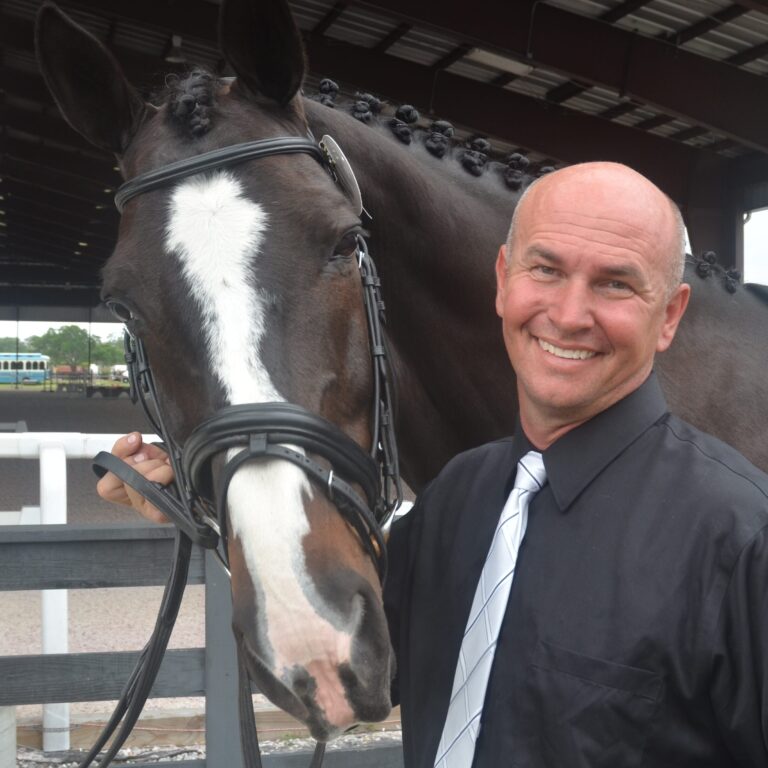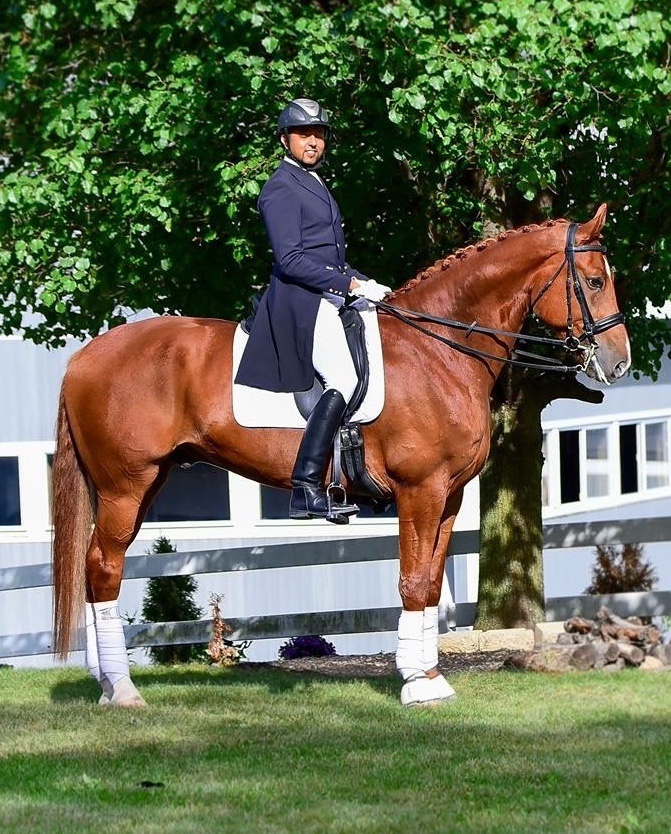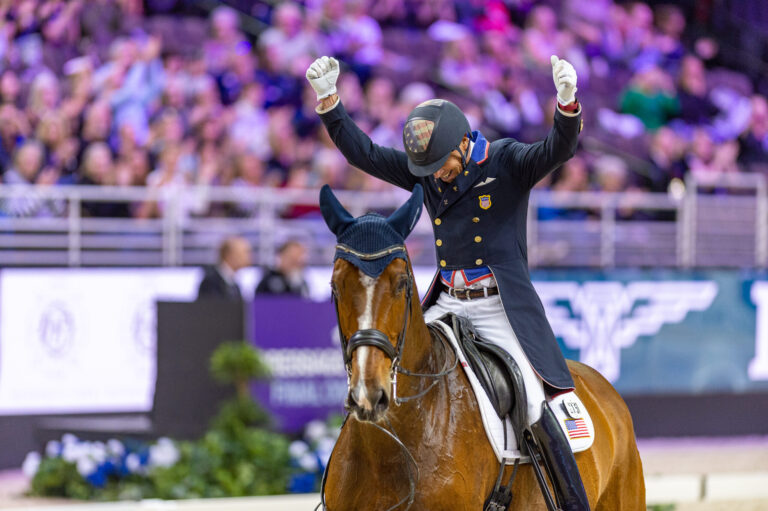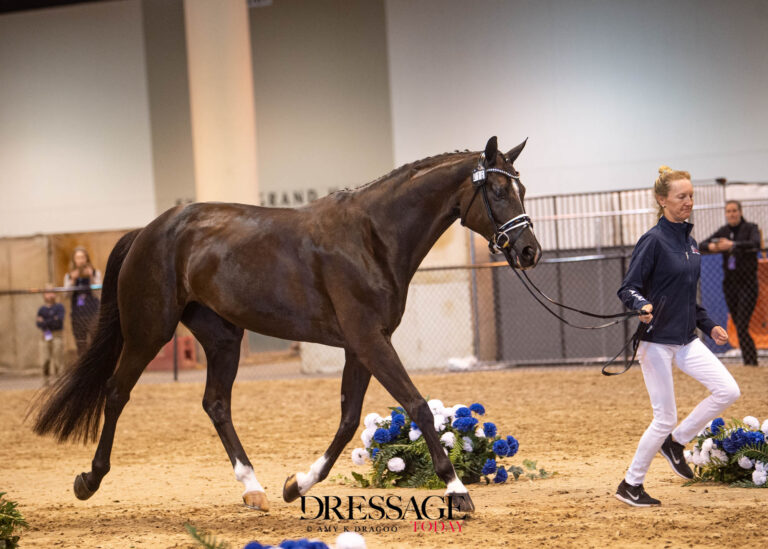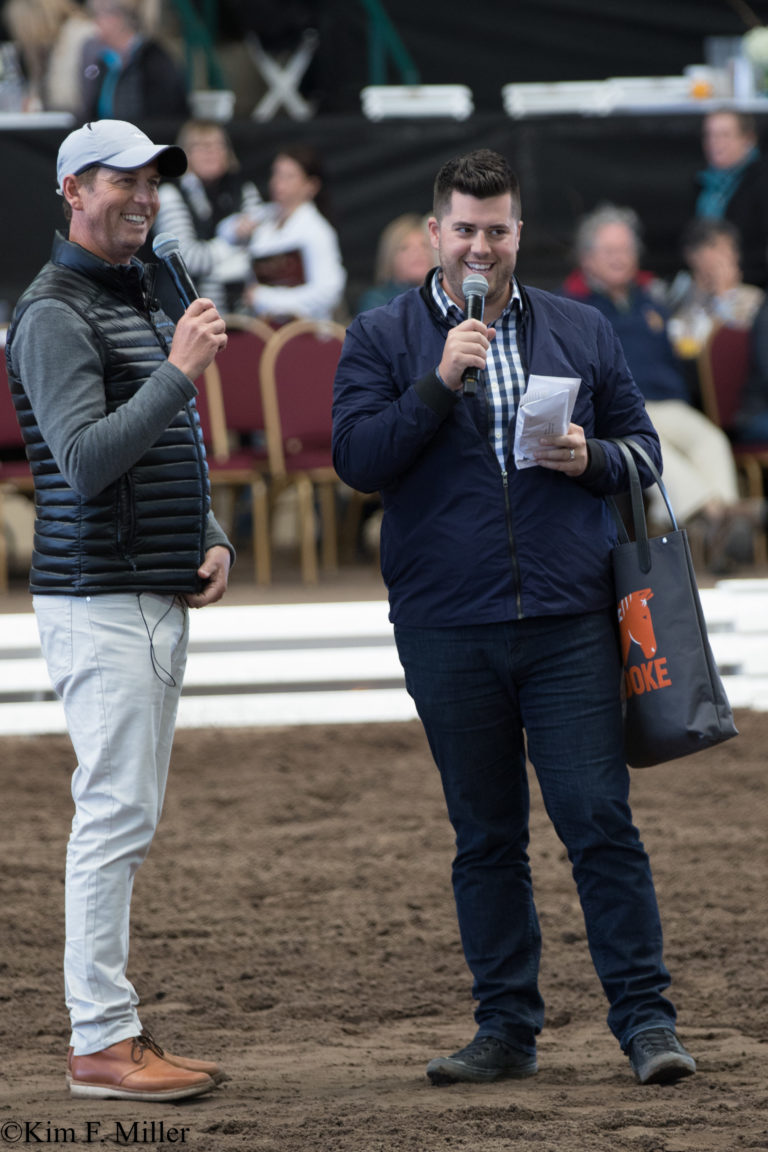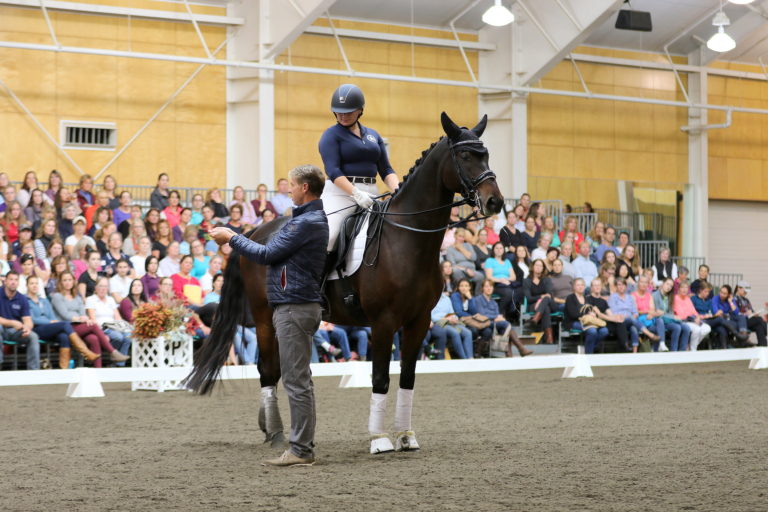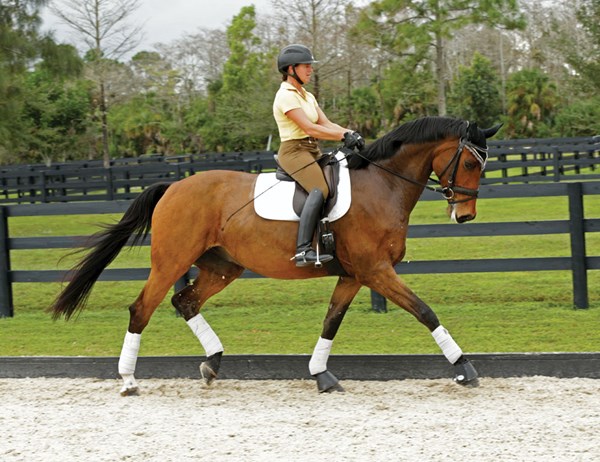Lisa Wilcox, a familiar face in the elite ranks of dressage, has her eyes on earning a ticket to Rio 2016. She’s got a packed schedule leading up to the Olympic Games and is currently campaigning two horses—the 13-year-old American-bred Oldenburg stallion, Pikko del Cerro HU, and Galant, a 10-year-old Belgian Warmblood—for the most prestigious equestrian competition in the world. But that’s not all she has on her plate. She has her heart set not only on earning herself a place on another U.S. team, but also securing one for a promising young adult rider with a unique story.
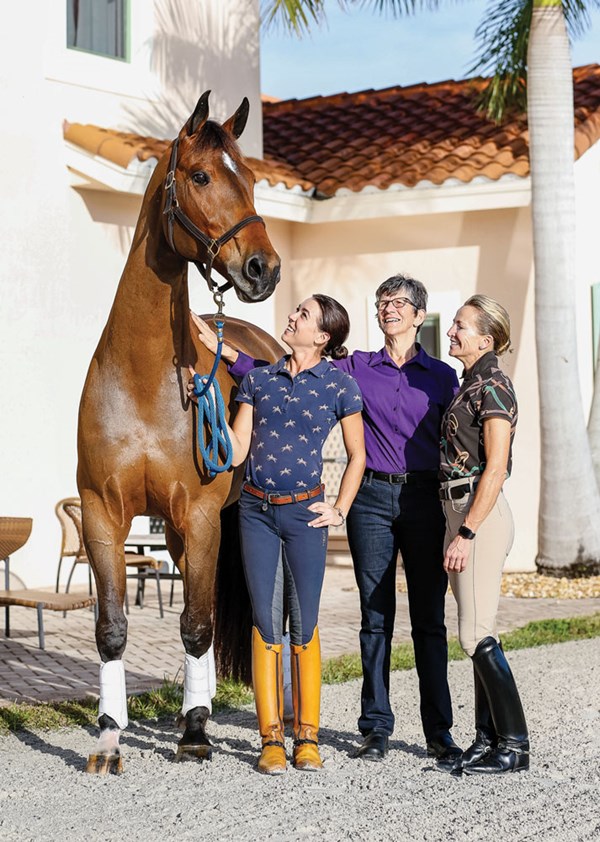
Rewind to the year 2004, when Lisa was preparing the Oldenburg stallion Relevant for the Athens Olympics. At the same time, in the distant coastal community of Camden, Maine, a 15-year-old girl named Hannah Michaels was just beginning to devote herself to the study of dressage after spending her childhood in the eventing world. Encouraged by her parents to follow her passion from an early age, Hannah began riding at age 7 and by age 8, she was competing in events with her 30-year-old leased Wilshire pony named Sonny. Since her very first competition aboard the pony, she became determined to ride in the Olympics and become an international-level competitor. Little did she know that 12 years later, Lisa Wilcox would be her guide in turning that dream into reality.
The Value of Relationships
In April 2015, Lisa first officially met Hannah, who was in search of a trainer. Hannah also had her own training business and clients, but was looking for someone to train with intensively. Up until that point, she and Lisa had often crossed paths at shows, but hadn’t exchanged more than a friendly hello. “I would see her at shows, but I was always kind of timid around her because she’s Lisa Wilcox,” Hannah admitted with a laugh. After the two had spoken at a horse show and then arranged a date to meet at Jacqueline Shear’s Marsh Pond Farm, the facility where Lisa is based in Wellington, Florida, Hannah got a chance to experience Lisa and her riding first-hand. “I had always thought she was friendly, but I couldn’t believe how genuinely nice she was,” she says. After watching Lisa ride Pikko del Cerro, Hannah asked if she would take her into training.

Hannah has always appreciated Lisa’s beautiful riding, specifically the way she is able to use her petite frame to control the larger horses. “I’ve always really admired her riding,” Hannah says of Lisa. “And I was drawn to her because of her size. We’re pretty similar in body build. I’ve worked with a lot of trainers who are men and I’ve learned a lot from them, but obviously they don’t really understand what it’s like to be a more petite woman riding these big, powerful horses. Sometimes they don’t really understand how much technique we have to have versus strength because I only weigh so much.”
When it comes to the theory and practice of technique, Lisa is an absolute expert. “Sitting on the horses that she’s trained, they’re so sensitive to every little part of your body, and that’s really cool,” Hannah says as she explains that Lisa is also extremely gifted at articulating concepts. “A lot of trainers might be able to ride, but they might not be able to really break it down for you. She’s just got a way with describing things and helping you figure out the pathway to get there.”
Much of Lisa’s technical skill originates from her attention to body position in the saddle, which Hannah says can be nearly overwhelming. “I am an FEI rider and I felt like I could barely ride a 20-meter circle. She’ll notice things like when my knee is just an inch too far forward.”
That kind of attention to detail, though, is one thing that attracted Hannah to the sport of dressage. “To me, that’s really fun because you never stop learning in this sport,” Hannah says. With the added benefit of Lisa’s tremendous amount of international competition experience, training with her was the perfect fit for Hannah. “She’s got so much show experience. That’s the type of rider I dream to be—an international competitor. And she’s brought so many horses to Grand Prix. She just keeps producing horse after horse.”
As Lisa and Hannah got to know each other better throughout their training, Lisa was struck by Hannah’s dedication, passion and the way she interacted with the horses. “She’s very loving and sensitive toward them in the way she communicates with them,” Lisa says. Apart from Hannah’s skill in the saddle, Lisa also appreciated her involvement in the care of the horses and how she interacted with them on the ground. “That’s so important to me in the training. Relationships with the horses are necessary to get to the top level. You have to have an incredible relationship with the horses, and she works with them that way. I loved watching that.”
Although the training of dressage horses is serious business, it’s also not unusual to see Lisa and Hannah having fun with their four-legged partners. “Lisa’s really funny,” Hannah says. “We can laugh about a lot. She’s so funny with the horses. When she’s not training, she’s making baby voices to them and is just silly in the same way that I am. I’m a total goofball around my horses. I feed them carrots out of my mouth, and she’s the same. As serious as she is, and what a talented rider and competitor she is, she’s a real horsewoman, too. We go out to dinner and have fun and laugh. She’s a super- happy person, and I look up to that. I want to be that. I see so many women in this industry who are successful but don’t seem happy. But she’s genuinely a happy person.”
Hannah describes Lisa as the ultimate role model and is quick to express her appreciation for the chance to work with her. “She’s given me so much confidence. I’ve had to believe in myself a lot, but to have someone else who also believes in you is just incredible. And I feel so grateful to have someone like her who just has my back and who pushes me. She’s still tough on me to be the best I can be, but she’s so supportive. I can call her about personal issues and horse issues, and she always has the best advice. I just feel so grateful to have her in my corner. She’s just been a steady rock for me. I just can’t believe I fell in the right place at the right time. If I’ve got a question, she’s got an answer. And if she doesn’t, we’re going to figure it out together.”
Making a Match
As their training progressed, Lisa was inspired to match Hannah with one of her own Grand Prix mounts, the 13-year-old Hanoverian gelding, Denzello (“Dino”). Lisa competed him extensively throughout the U.S. and Europe and has a firm understanding of the kind of riding that brings out the best in him. “He’s a big guy,” she says. “He has all kinds of gears. He can be easy and soft and then he can get uptight and tense. So you have to be able to deal with a big 17.3-hand horse. You have to be able to work through when he’s having a mental cramp and might get a little strong. But he’s a gentle giant. It’s just internal tension that makes him strong. And then when he relaxes, you have to be able to support him. He’s kind of a timid horse for as big as he is. He’s not super courageous. He’ll go anywhere that he trusts you to take him.”

Lisa felt that Dino’s sensitive personality would thrive with Hannah’s calm temperament. “So a couple of months into the training I asked if she wanted to sit on him. And he liked her right away,” Lisa says. Hannah was stunned when Lisa suggested she ride one of her Grand Prix horses. “I didn’t want to mess him up,” she says. “But Lisa knew we had the right personality for each other.”
That was the beginning of a partnership that blossomed quickly. “It evolved into a love affair,” Lisa says. “It’s adorable. She’ll just walk by his window and he’ll nicker at her. He only has eyes for Hannah right now.”
Hannah describes Dino as an incredibly well-trained horse with a few quirks. “Lisa has done an amazing job with him but he is a funny horse,” she says. “He’s a little complicated to ride because he’s huge and he’s very powerful, but he’s so sensitive at the same time. So it’s a challenge having to find that balance with the power he has and to be technically good enough to not disrupt his sensitivity. It’s been really fun to ride him. You have to be so sensitive, yet strong at the same time.”
In the barn, Dino always has his head out the window to greet people who walk by. “He’s the sweetest horse,” Hannah explained. “You can go in his stall and he’ll cuddle with you. I don’t think he even knows how to pin his ears back. We have a great relationship because Lisa did all of the tough work on him and now we just get to dance and play. It’s been really fun to build that relationship with him.”
Lisa and Hannah have more in common than just the ability to ride horses like Dino. Lisa says that she sees a lot of herself in Hannah, which just might explain why they are such a well-matched pair. “She’s got the drive, the passion, the discipline and the love for the horse,” Lisa says. “We’re very similar in how we communicate with the horses. Until I met Hannah, I had yet to find someone who related to the horses like I did or communicated to the horses like I do.”
Pursuing the Ultimate Dream
According to Lisa, Hannah is more than just a determined horsewoman and talented rider. She also has tremendous character, which perhaps shone brightest through a time of darkness, when she received a devastating diagnosis at just 14 years old. One day, as she was waiting for her father to pick her up from a riding lesson, she began to lose sensation in her feet. When she arrived home, she was completely paralyzed from the waist down. She was eventually diagnosed with a disease called acute transverse myelitis, an autoimmune disease in which a person’s antibodies attack the spinal cord. Medical professionals told Hannah and her family that she would probably never walk again. There was less than a 5 percent chance of recovery.

Against the odds, Hannah made a miraculous recovery and her goals transcended the desire to walk again. Though she still deals with some side effects of the disease, she wants to be the best rider she can be and eventually end up on a podium. And Lisa wants her there, too. “I want her on a team and I want her on a team that medals,” Lisa says firmly. “That is my ultimate dream.”
Lisa, who perhaps knows better than anyone else, is very aware that it takes time to get a horse and rider to the level that she hopes for Hannah and Dino. “But this is a horse-and-rider combination that has time,” she says. “He’s only 12. He’s turning 13 next year and he’s getting more seasoned by the day. He’s talented beyond words—incredibly spectacular. And if he trusts you, you get all the gears.” The current plan is for Hannah and Dino to shoot for Rio, and following that, the next World Equestrian Games. Lisa believes Hannah and Dino are up to the task.
Hannah is so poised in the face of challenge that Lisa did not learn of her past trials until well into their partnership. It wasn’t until they produced a video together to attract investors who would help financially support Hannah’s journey with Dino that Lisa became fully aware of what Hannah overcame. “When I first watched the video, I got choked up. It wasn’t something she originally wanted to tell anybody. She wanted to keep it more or less to herself because she didn’t want people to judge her for it,” Lisa says.
Despite the fact that Hannah rarely mentioned the issue, Lisa decided that it’s an important part of her story to share because it speaks volumes of her will to fight. “If you’re going to be a team rider, you have to have tenacity and discipline and have a hard work ethic. There aren’t any sob stories. There are no excuses. You just keep on keeping on if you want to make it to Olympic level,” she says.
Hannah explained that even though it’s a story she hasn’t told many people—even some of her past trainers didn’t know—the experience of it shaped her into the person she has become. “I had to relearn how to walk. I was in the hospital for more than three months. At 14, that’s a pretty tough lesson to learn, that your life is so fragile. But it made me who I am today,” she says. Hannah still has residual nerve damage, but doesn’t let it interfere with daily life. Instead, she directs her energy toward maintaining her health by eating responsibly and making regular trips to the gym.
“Listen to her story,” Lisa says. “It’s such an inspiration to me on a daily basis—that someone at an early age could possibly be paralyzed but overcame it. That’s such a testament to her desire and passion to ride and beat the odds. She’s continuing on this path as if nothing ever happened. I admire that. That’s a lot like me. You don’t look back, you don’t think twice because you know you can do it. And you look at life as though the glass is always half full. That’s what I like about Hannah. She’s a very positive person.”
In addition to the necessary qualities that all top riders share, including drive, passion, determination and dedication, Hannah possesses a quality that Lisa values highly: humility. “There’s not a bit of arrogance about her. She understands the work and she’s ready to pull her sleeves up and get down and dirty and do what you have to do to get it done,” she says. No matter how successful Hannah may be at a show, she is critical enough about her own riding to be realistic about things that need to be better and be corrected. “That’s humility,” Lisa says. “There’s no star factor to what we do, in my opinion. There are moments of brilliance that are wonderful, and we can be grateful but not gloat because they’re animals—not robots. And we have to keep a clear perspective of who we are and what we’re doing and maintain a balance. It’s about the horses. It’s not about our own egos. It’s about being the best we can for our horse.”
Although Lisa has played the role of a mentor to Hannah, Lisa credits her student with helping her immeasurably. “She’s been an inspiration to me for sure. But it’s been fun to have someone come in and understand the horses like I do and have her sit on the sidelines and then we can discuss the horses and be on the same wavelength. She’ll sit in on every horse I ride. She wants to see. She’s like a sponge. We’ll discuss in detail all of my rides. It’s lovely to have a soundboard, and she’s got an exceptionally good eye that I can trust. And that has given me renewed energy. She’s been like a 27-year-old battery that I’ve just plugged into. She gives me energy and motivation.”
A Return to the Olympics
As for Lisa’s own quest to get herself back on an Olympic team, energy and motivation are key factors but only a piece of the puzzle. For example, making sure your horse peaks at exactly the right time is a major concern. “You want your horse to be in the right spot in the right time, so you don’t want to overshow him and at the same time you want him to have enough experience,” Lisa says. “It’s managing his physical and mental well-being throughout the qualifying process.”

According to Lisa, that’s a matter of knowing your horse and knowing when you need to take a break or having a sense for when he’s a little mentally frazzled. “Knowing that is part of having a strong relationship with your horse,” she says.
To keep herself in top form for high-pressure competition, Lisa emphasizes the importance of a healthy lifestyle. “I definitely do not use a masseuse as often as I should. But what I do is stretch and run once a week to maintain my own physical health. I try to eat well and get lots of sleep. That is one of my big priorities: sleep. That’s the only way I feel like I can be on my game mentally.”
Being able to perform at a high level in less-than-ideal circumstances is a necessary skill of an Olympian, too. “You train yourself to train tired because you have to—it happens. Sometimes our schedules don’t permit otherwise. But if I can get at least eight hours of sleep every evening, if not nine, that’s when I feel my strongest. But that’s the best-case scenario and it doesn’t always happen so you’ve got to keep on keeping on. You have to train yourself to do that and you have to be able to take the good with the bad in not optimal circumstances,” Lisa says.
Another challenge to take into account during preparation for the Olympics includes consideration of the physical location of the competition. “We’re finding out that we aren’t going to be able to import hay so we’re going to have to try to find a hay in Rio that is similar to what we’re feeding now,” Lisa says. “Trying to duplicate your horse’s feeding program is always a challenge in countries where laws about importing are strict.” The pressures of performing for your team can also be a challenging aspect of Olympic competition. As an individual, Lisa says she was a confident rider. “The only person I was hurting if I did poorly was myself and obviously the person I was riding for.” But on a team, things change. “It dawns on you quickly that your score and your riding could quite possibly affect three other riders and whether or not you get a medal. That is very humbling. When you ride for yourself, you don’t have the same pressure. Riding for yourself, you know you want to beat your last score. Riding for a team, you have to say, ‘I have to be better than a certain percent in order for us to get a medal,’ and now the pressure’s on. You’re not only trying to beat your last score, you’re actually calculating that there’s a running percentage out there that you have to beat. That’s what separates the men from the boys as far as your ability to compete as a team member. You either crumble under pressure or you ride to the occasion.”
The Road Ahead
No matter the age or experience level of the rider, the path to the Olympics is not a smooth one. For Hannah, however, making the journey beside Lisa could not feel more right.
“I’ve worked with a lot of trainers who taught me a lot but never really took me under their wing. I’ve never really had someone who’s seen the potential in me and wants to nurture that,” Hannah says.
“It’s pretty emotional for me. I don’t feel like I’m alone anymore. I’ve been fighting this fight. I’m really very hungry to learn but to also have someone of her caliber believe in me and push me and think that I can do it as much as I’ve wanted to do it is just like a dream come true. I just feel like it was all meant to happen.”
Bringing Dream Horses to Reality
No Olympic dream is possible without a formidable team behind it. As the breeder of two of Lisa’s top stallions, Pikko del Cerro HU and Gallant Reflection HU, Anne Sparks has played a critical role in Lisa’s success. Based in Albuquerque, New Mexico, Anne is the CEO of Horses Unlimited, one of the premier sport-horse breeding and training facilities in the United States. Horses bred by Horses Unlimited have received numerous awards across the country, ranging from USDF Horse of the Year titles to USDF All Breed Awards and even Young Jumper Championships. The farm excels with a strong network of industry experts and partners not only with dressage professionals such as Lisa Wilcox and Mikala Gundersen, but also top jumper riders such as Todd Minikus and Henrik Gundersen. Anne has extensive knowledge of the breeding industry and has become a master at making ideal matches between her fleet of top mares and stallions to produce quality foals. “I work with what I have and I make it all fit together,” she says of her breeding strategy. Most importantly, she believes in the foals she produces. “I have real faith in my horses,” she says. “I know to breed for a good walk and a good canter.”

As a rider herself, Anne is passionate about the dressage community and its people. “I’ve met some really wonderful people over the years who are really invested in the horses,” she says. According to Anne, Lisa is one person who embodies just that. She and Lisa became connected several years ago through Mikala, who originally rode Pikko del Cerro HU before passing on the ride to Lisa. Anne was most impressed by Lisa’s commitment to the sport. “She is committed to the animal and its welfare,” she says. “Lisa is there. She is on committees; she’s part of the USDF. As a top rider, she is committed to making the sport better and that is fantastic. I wish there were more riders out there who would make that kind of commitment.”
The two have formed a dynamic relationship, where mutual trust is the common denominator. “Lisa trusts me and I trust her knowledge,” Anne says. “There are moments of brilliance that you see in a horse as a breeder and then sometimes you put a rider on them and it fades. But you have to be there to see that initial moment of brilliance. Those moments come and go. I know what’s there in a particular horse. With the riding, I trust Lisa. It’s a process to get to a particular result. Like when they’re young, there are moments that are brilliant and there are moments that are not so brilliant. It’s the same in the training. But it will come eventually, and you just have to know that the brilliance is there,” she says. “We respect each other’s opinions and I trust her to get the most out of my horse. She also trusts me to see and let her know those moments of brilliance are there when the horses are young.”
As for Anne’s aspirations for the horses she breeds, she says they vary from horse to horse. “I want to breed athletic horses who serve their owners to the best of their ability. They don’t all have to be Olympic horses. My hope for each horse is to find a really solid place—a home, a life.”

An Olympic Memory
Looking back at her own past experience at the Athens Olympics, Lisa remembers the opening ceremonies as one of the most emotional moments for her. “The opening ceremonies at the 2004 Olympics were awesome. It was breathtaking and humbling. It was phenomenal. You have to remember that we had just gone through 9/11 and so for us in Athens, security was intense. Walking into the stadium, we came in as a nation. As worried as we were that there might have been sharpshooters, we received a standing ovation for the United States of America walking in. I’ll never forget that. We all were in tears.” Lisa explains that for security reasons, U.S. athletes entered the stadium together in a very tight formation, which she says resembled a school of fish. “But as soon as we got to the entrance and the slow, standing ovation started, our little “school” of athletes began to spread out, lift up our arms and wave. We became proud again and free to cheer in that exceptional moment. We went from being fearing, humble people to proud athletes. I will never forget that.”


